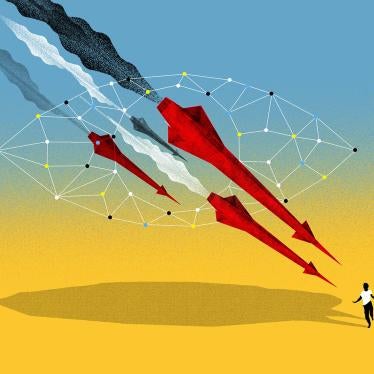(Dakar) - Alassane Ouattara should take concrete measures to ensure that troops under his command fighting in Côte d'Ivoire's commercial capital, Abidjan, do not commit reprisals or other abuses against civilians or supporters of Laurent Gbagbo, Human Rights Watch said today. Ouattara should publicly pledge to hold accountable all members of his forces implicated in serious violations of international law, Human Rights Watch said.
Ouattara's troops, now called the Republican Forces of Côte d'Ivoire (Forces Républicaines de Côte d'Ivoire, FRCI) comprise a loose coalition of combatants who previously fought for the Forces Nouvelles ("New Forces") rebellion, neighborhood-based defense forces, and former Ivorian army soldiers, policemen, and gendarmes who have recently defected from Gbagbo's side.
"Ouattara should send an unequivocal public message to all his commanders and forces fighting on his behalf that reprisals of any kind will be punished," said Daniel Bekele, Africa director at Human Rights Watch.
In mid-March, 2011, forces loyal to Ouattara, who is internationally recognized to have won the November 2010 presidential election, began a concentrated military offensive to take over territory controlled by security forces and militias loyal to Gbagbo, who has rejected calls to step down.
Human Rights Watch has documented a four-month period of widespread abuses against civilians in which about 500 people have lost their lives, according to United Nations estimates. Human Rights Watch continued to urge all parties to the conflict to respect international humanitarian law, including not attacking civilians and ensuring the humane treatment of anyone in custody. UN peacekeepers should further enhance the protection of civilians, especially in light of the threat of reprisals, Human Rights Watch said.
The vast majority of abuses documented by Human Rights Watch were perpetrated by forces loyal to Gbagbo against real or perceived Ouattara supporters, notably members of political parties allied to Ouattara, as well as West African immigrants and Muslims. The documented abuses include targeted killings, enforced disappearances, politically motivated rapes, and unlawful use of lethal force against unarmed demonstrators. These abuses, committed over a four-month period by security forces under the control of Gbagbo and militias loyal to him, may rise to the level of crimes against humanity as defined by the Rome Statute, which created the International Criminal Court (ICC).
Human Rights Watch has also documented extrajudicial executions by Ouattara's forces against alleged pro-Gbagbo supporters and combatants detained in Ouattara territory since the Forces Nouvelles gained effective control of parts of Abidjan in late February. Human Rights Watch documented 11 such cases from both witnesses and perpetrators - including three detainees who were burned alive and another four whose throats were slit, acts amounting to war crimes under international humanitarian law. Credible reports indicate the death toll may be higher.
Human Rights Watch has also received credible reports of abuses committed when Ouattara's forces took control of several towns in western Côte d'Ivoire. A March 7 attack by pro-Ouattara fighters on the village of Anonkoua, near the Abobo neighborhood of Abidjan, left at least nine civilians dead in an apparent case of collective punishment against alleged civilian supporters of Gbagbo. Ouattara has denied that his forces were responsible for the attack. The killing of civilians by pro-Ouattara forces, at times with apparent ethnic or political motivation, also risks becoming a crime against humanity should it become widespread or systematic.
Human Rights Watch has stressed the importance of a full investigation of and accountability for atrocities in Côte d'Ivoire. On March 30, the UN Security Council unanimously approved a resolution that calls upon all parties to cooperate fully with an international commission of inquiry put in place in late March by the UN Human Rights Council to investigate human rights violations committed in Côte d'Ivoire.
The Office of the Prosecutor of the ICC has repeatedly indicated that it will prosecute crimes committed in Côte d'Ivoire if the court's requirements for investigation - which relate to the gravity of the crimes and the inadequacy of national proceedings - are met. An investigation could be triggered by a referral of the situation by the UN Security Council or any state that is party to the court, or if the prosecutor decides to act on his own authority. While Côte d'Ivoire is not a party to the court's Rome Statute, it accepted the court's jurisdiction through a declaration in 2003. The Security Council resolution references this declaration and states that the report of the commission of inquiry should be provided to the Security Council and "other relevant international bodies."
In a March 31 televised statement to the Ivorian people, Ouattara urged the Republican Forces of Côte d'Ivoire and all military and paramilitary forces who had "rallied with them" to refrain from committing atrocities. While such statements are important, they need to be backed by measures to ensure that combatants implicated in abuses are held accountable, Human Rights Watch said. Human Rights Watch called on Ouattara and commanders of the Republican Forces of Côte d'Ivoire to:
- Publicly order all members of their forces, regardless of rank, to abide by international human rights and humanitarian law. Commanders should be aware that they can be held criminally responsible for failing to prevent or punish criminal acts by their subordinates;
- Take all necessary measures to ensure the humane treatment of anyone in custody, including captured combatants from Gbagbo's forces, and allow access by international and domestic monitors; and
- Investigate cases of extrajudicial executions and other serious abuses and hold perpetrators accountable after fair proceedings in accordance with international standards.






